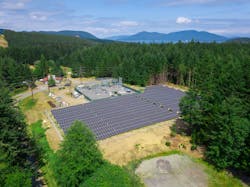Washington State Department of Commerce Grants $7.5M to 5 Tribes for Clean Energy Projects
The Washington State Department of Commerce has announced $7.5 million in grants to five Washington tribes to plan, design, and build clean energy projects.
The clean energy grants, funded by Washington’s Climate Commitment Act, are part of an $83 million opportunity, including $16 million for a targeted tribal clean energy fund and $67 million for projects improving environmental justice and equity.
According to Mike Fong, Commerce Director, tribes within Washington possess unique and personal visions to achieve a more equitable climate future, and award recipients are located on both sides of the Cascades.
“The Climate Commitment Act recognizes that communities will not feel the effects of climate change equally,” said Fong. “We know that there is a history of government assuming it knows best when it comes to what communities need, and we’re intentionally reversing that thought process. We hope this is the first of many funding opportunities that respond directly to what people tell us they need.”
The five awardees and their clean energy projects are:
- Confederated Tribes of the Chehalis Reservation — Community Center Solar Panels, Oakville: $251,000 to build a 121 kW roof-mounted solar installation for the tribe’s Community Center and to complete a feasibility study to add future battery storage at the center.
- Cowlitz Indian Tribe—Resilient Energy and Supplemental Power Project Phase II, Longview: $1.7 million to build a 100 kW solar array and battery energy storage system on administrative and clinic buildings to power them and provide supplemental power for electric vehicle charging.
- Spokane Tribe of Indians — Western Nuclear Solar Farm Project, Wellpinit: $90,000 to evaluate the viability of repurposing the tribe’s historic uranium mine for solar energy generation.
- Willapa Bay Enterprises—Renewable Ocean Wave Energy Technology Demonstration Project, Tokeland: $2,744,507 to support the design, permitting, siting, and construction of technology producing zero-emission hydrogen from ocean wave energy.
- Yakama Power – Solar Over Canal Project, Toppenish: $2.75 million to support permitting, environmental review, and predevelopment work for an innovative 200 MW solar over canal project leveraging $160 million in federal and state funding.
The Tribal Clean Energy Grant Program will accept applications through September 27, 2024. Applications received by July 19, 2024, will be announced in August, and those received by the final deadline will be announced in October 2024.
Commerce will announce the second round of Community Decarbonization grants in the coming weeks. Applications will be accepted for a general solicitation for clean energy projects, which is open to projects and applicant types from all over the state. Applications for these grants will close on June 14, 2024.
About the Author
EnergyTech Staff
Rod Walton is senior editor for EnergyTech.com. He has spent 17 years covering the energy industry as a newspaper and trade journalist.
Walton formerly was energy writer and business editor at the Tulsa World. Later, he spent six years covering the electricity power sector for Pennwell and Clarion Events. He joined Endeavor and EnergyTech in November 2021.
He can be reached at [email protected].
EnergyTech is focused on the mission critical and large-scale energy users and their sustainability and resiliency goals. These include the commercial and industrial sectors, as well as the military, universities, data centers and microgrids.
Many large-scale energy users such as Fortune 500 companies, and mission-critical users such as military bases, universities, healthcare facilities, public safety and data centers, shifting their energy priorities to reach net-zero carbon goals within the coming decades. These include plans for renewable energy power purchase agreements, but also on-site resiliency projects such as microgrids, combined heat and power, rooftop solar, energy storage, digitalization and building efficiency upgrades.
